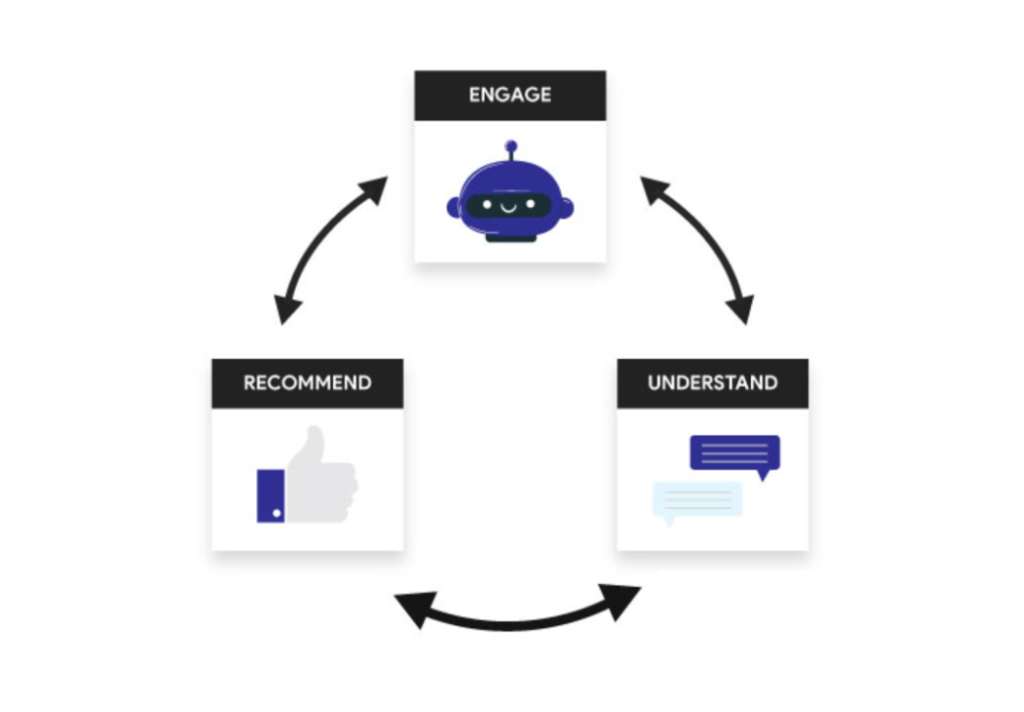Referral marketing has long been celebrated for its ability to leverage existing customer networks to drive new business. In this era of technological advancement, Conversational AI emerges as a game-changer, amplifying the effectiveness of traditional referral strategies.
The Evolution of Referral Marketing
Referral marketing, once reliant on word-of-mouth and manual outreach, has undergone significant transformation with the digital age. Traditional referral programs often faced limitations in scale, personalisation, and real-time engagement. Recognising these challenges, businesses are turning to innovative technologies to breathe new life into their referral strategies.
The Rise of Conversational AI
Enter Conversational AI, an intelligent technology designed to mimic natural human conversation. With advancements in natural language processing and machine learning, Conversational AI has emerged as a powerful tool for businesses seeking to not only connect with their audience but also to enhance the referral marketing experience.
Unerstanding the Shift: Consumer Expectations and Behavior
Consumer expectations are at an all-time high, and the modern consumer demands seamless, personalised interactions. Traditional referral methods, while effective in their own right, struggled to keep pace with the immediacy and personalisation consumers now expect. Conversational AI bridges this gap by offering a platform for real-time, personalised conversations, aligning with the preferences of today’s digitally savvy consumers.
Utilising Conversational AI for Persuasive Referral Messaging
Persuasion lies at the heart of effective copywriting, and when seamlessly integrated with Conversational AI, it becomes a potent force in referral marketing.
Effective persuasion begins with a deep understanding of the psychological triggers that drive human behavior. Conversational AI, with its ability to analyse and respond to user emotions, provides a unique advantage. By tapping into the emotional landscape of the audience, businesses can create conversations that resonate on a personal level, fostering a connection that goes beyond the transactional.
Conversational AI also serves as a trust-building tool by fostering authentic, two-way conversations. Through personalised interactions, businesses can establish a sense of trust, making customers more inclined not only to make referrals but to do so with genuine enthusiasm.

Driving Conversions Through Intelligent Interactions
Conversion optimisation is the heartbeat of any successful marketing strategy, and when paired with Conversational AI in referral marketing, it becomes a dynamic force that maximises the impact of every interaction.
One of the key advantages of Conversational AI lies in its ability to dynamically personalise interactions based on user data. By analysing user behavior, preferences, and past interactions, businesses can tailor referral conversations to resonate with each individual. It can streamline the referral process, minimising friction and making it easy for users to engage.
Real-Time Support and Assistance
Conversion rates often hinge on providing timely assistance and addressing user queries. Conversational AI acts as a 24/7 virtual assistant, offering real-time support within the referral conversation. Businesses can leverage AI-driven chatbots to address user concerns, provide additional information, and overcome objections in real-time, ensuring that potential barriers are addressed promptly and conversion opportunities are not missed.
Strategic Product Recommendations
Upselling is a proven strategy for maximising the value of each customer. Conversational AI, with its intelligent recommendation engines, can suggest relevant products or services seamlessly within referral conversations. It can analyse user interactions and trigger personalised recommendations based on behavior.
Navigating Consumer Psychology with Conversational AI

Understanding consumer psychology is paramount in crafting persuasive and engaging referral marketing strategies. Conversational AI serves as a powerful ally in this endeavor, tapping into consumer emotions, preferences, and decision-making processes.
Emotional Intelligence in Conversational AI
Consumers make decisions based on emotions, and Conversational AI has the ability to analyse and respond to emotional cues within conversations. By employing sentiment analysis algorithms, businesses can gauge the emotional tone of users and tailor responses accordingly.
Personalisation and Tailored Experiences
The way a message is delivered significantly influences its reception. Conversational AI allows businesses to customise communication styles based on user preferences. Whether it’s a casual and friendly tone or a more formal approach, AI can adapt its language to resonate with the specific communication style preferred by each user, enhancing the overall user experience and fostering a positive emotional connection.
Exclusivity, Scarcity, and FOMO
The principles of exclusivity and scarcity are potent psychological triggers, and Conversational AI can strategically deploy them within referral interactions. Businesses can create a sense of exclusivity by offering limited-time referral rewards or exclusive access to special events. By triggering the fear of missing out (FOMO), Conversational AI compels users to participate eagerly, driven by the desire to be part of an exclusive opportunity.
Best Practices and Implementation Strategies
Implementing Conversational AI seamlessly into existing referral programs requires careful planning, strategic decision-making, and a focus on user experience. We´ll explores the step-by-step process, from selecting the right tools to crafting compelling scripts, ensuring that businesses can optimise results and create a seamless conversational experience for their users.
Define Clear Objectives and Goals
Before diving into implementation, businesses must define clear objectives and goals for integrating Conversational AI into their referral programs. Whether the aim is to increase participation, boost conversion rates, or enhance user engagement, having well-defined goals ensures that the implementation aligns with broader marketing objectives.
Select relevant Key Performance Indicators (KPIs) that align with the defined objectives. This could include metrics such as referral sign-ups, conversion rates, or user satisfaction. By establishing measurable KPIs, businesses can gauge the success of their Conversational AI implementation and make data-driven adjustments for continuous improvement.
Select the Right Conversational AI Tools
The success of Conversational AI integration hinges on selecting the right tools. Evaluate different Conversational AI platforms based on factors such as natural language processing capabilities, scalability, and integration options. Consider platforms that align with the technical requirements and goals of the referral program, ensuring a seamless fit.
Ensure that the chosen Conversational AI platform integrates smoothly with existing systems and databases. This includes CRM systems, referral tracking tools, and any other relevant platforms. Seamless integration avoids data silos and allows for a unified approach to user interactions and referrals.
Develop a User-Friendly Conversational Flow
Crafting a user-friendly conversational flow is crucial for successful implementation. Map out user journeys, identifying key touchpoints and potential interactions within the referral process. Consider the logical flow of conversations, ensuring that users are guided effortlessly from initiation to completion.
Develop compelling scripts that resonate with the target audience. Conversational AI should emulate natural human dialogue, engaging users in meaningful and interactive conversations. Incorporate persuasive language, clear calls-to-action, and personalised elements to enhance user engagement and encourage participation in the referral program.
Leverage Personalisation and User Insights
Harness the power of user data to create personalised conversational experiences. Tailor interactions based on user preferences, behaviors, and past referral activities. Leverage Conversational AI’s ability to analyse and respond to individual data points, ensuring that each user feels uniquely addressed and motivated to participate.
Implement Multichannel Accessibility
Incorporate multichannel accessibility to meet users where they are. Whether through website chatbots, social media messaging platforms, or mobile apps, ensure that Conversational AI provides consistent and seamless conversations across various channels. This enhances user convenience and accessibility, promoting a unified experience.
Monitor and Analyse Performance Metrics
Implement robust monitoring and analytics tools to track the performance of Conversational AI within the referral program. Measure KPIs such as user engagement, conversion rates, and referral success. Regularly analyse performance metrics to identify areas for improvement and optimise conversational flows based on real-time data.
Establish an iterative optimisation process based on data insights. Continuously refine scripts, user flows, and personalised elements to enhance the effectiveness of Conversational AI in driving referral program success. A commitment to continuous improvement ensures that the implementation remains adaptive to changing user behaviors and preferences.
Ensure Compliance and Privacy
Prioritise data privacy and compliance with relevant regulations. Clearly communicate how user data will be used within Conversational AI interactions and ensure that the implementation aligns with privacy standards. This transparency builds trust and ensures a positive user experience.
Provide Ongoing Support and Training
Conduct thorough training for Conversational AI agents to handle a variety of user scenarios effectively. Equip agents with the knowledge to provide assistance, answer queries, and guide users through the referral process. Ongoing training ensures that Conversational AI remains a valuable and supportive resource for users.
Solicit User Feedback and Iteratively Improve
Actively seek user feedback on the Conversational AI experience within the referral program. Implement surveys, feedback forms, or direct user prompts to gather insights into user satisfaction and areas for improvement. User feedback becomes a valuable resource for iteratively enhancing the Conversational AI implementation.
Test and Optimise for Scalability
Before and after implementation, conduct rigorous testing to ensure the scalability and reliability of Conversational AI within the referral program. Test for various user scenarios, potential bottlenecks, and system integrations. A thorough testing protocol minimises the risk of issues impacting user experience during high-demand periods.
Foster a Unified Brand Voice and Experience
Maintain a consistent brand voice and experience across Conversational AI interactions. Align the language, tone, and messaging with the established brand identity. Consistency reinforces brand recognition and trust, creating a unified experience for users engaging in referral conversations.
Ensure that referral incentives presented within Conversational AI conversations align with the brand values and messaging. Consistency in branding fosters authenticity, making users more likely to participate enthusiastically when the referral program is perceived as an integral part of the overall brand experience.
Anticipating Results and Benefits
The stage is set, and the promise of Conversational AI in referral marketing is compelling.
Conversational AI serves as the catalyst for elevating customer engagement within referral marketing. By fostering dynamic and personalised conversations, businesses can create meaningful interactions that go beyond traditional referral methods. Users are no longer passive participants; they become actively engaged advocates who enjoy a two-way dialogue with the brand, resulting in deeper connections and increased enthusiasm for the referral process.

Optimising the Conversion Funnel
One of the most significant benefits of integrating Conversational AI is the potential for a measurable boost in referral conversion rates. Conversations guided by AI-driven scripts can strategically lead users through the conversion funnel, addressing concerns, providing valuable information, and delivering persuasive calls-to-action. Anticipate a more streamlined and optimised referral process that enhances the likelihood of users converting from participants to passionate advocates.
Informed Decision-Making and Iterative Enhancement
The integration of Conversational AI provides businesses with a wealth of data-driven insights. Anticipate access to real-time analytics that reveal user behaviors, preferences, and conversion patterns. This data becomes a valuable resource for informed decision-making and iterative enhancement of the Conversational AI implementation. Businesses can continuously refine scripts, optimise user flows, and adapt strategies based on actual user interactions, ensuring ongoing improvement and effectiveness.
Maximising the Long-Term Value of Customers
The positive impact of Conversational AI on customer engagement, loyalty, and advocacy contributes to an overall increase in customer lifetime value. Anticipate customers who not only make successful referrals but remain actively engaged with the brand over the long term. The enhanced connection forged through Conversational AI interactions translates into a more valuable and enduring relationship between the business and its advocates.
Meeting the Expectations of Modern Consumers
As consumers increasingly seek personalised, interactive, and convenient experiences, integrating Conversational AI aligns with evolving preferences. Anticipate positive reception from users who appreciate the modern and user-centric approach to referral marketing. Businesses that leverage Conversational AI demonstrate adaptability and responsiveness to changing consumer expectations, enhancing their overall brand image.


